

Confessions of an Opinionated Book Geek - Writing Tips #41: DOS and DON'TS: HOW TO WRITE THE... Confessions of an Opinionated Book Geek - Writing Tips #4 How to Format a Manuscript. Confessions of an Opinionated Book Geek - Writing Tips #42: How to Cut Your Manuscript by... Confessions of an Opinionated Book Geek - Writing Tip #89: Time to revise, but how will I... Confessions of an Opinionated Book Geek - Writing Tips #147:Revising Drafts. Confessions of an Opinionated Book Geek - Writing Tips #148:How to Revise, Edit and... Amanda Patterson (The Top Ten Mistakes Writers Make When...) FAQs About Self-Publishing. On your commercial publishing pages, you come down hard on self-publishing.
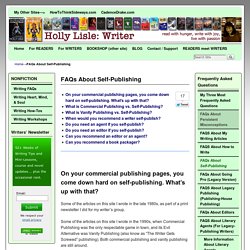
What’s up with that? Some of the articles on this site I wrote in the late 1980s, as part of a print newsletter I did for my writer’s group. Some of the articles on this site I wrote in the 1990s, when Commercial Publishing was the only respectable game in town, and its Evil Alternative was Vanity Publishing (also know as “The Writer Gets Screwed” publishing). Both commercial publishing and vanity publishing are still around. The new kid in town, however—Self-Publishing With Really Cool Sharp Pointy Teeth—did not yet exist, and agents, editors, and publishers of both the Commercial and Vanity varieties had no clue it was coming. I offered the best information available at the time, which was Go With Commercial Publishing because you don’t want to get screwed by Evil Vanity Publishing. What is Commercial Publishing vs. Commercial (Mainstream, Professional) Publishing is the following process: Okay. You’re right. No. How to edit a novel manuscript.
The final paragraph, the final sentence, the final full stop - your novel is finally finished!
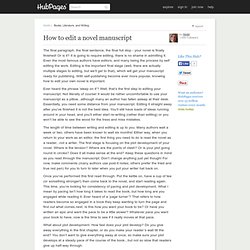
Or is it? It is going to require editing, there is no shame in admitting it. Even the most famous authors have editors, and many being the process by self editing the work. How To Sell 1 Million Books On Kindle: Lessons Learned From John Locke. 100 Awesome Open Source Tools for Writers, Journalists, and Blog. Should You Self-Publish? I've been getting a lot of emails from people wondering if they should self-publish, specifically on the Amazon Kindle.
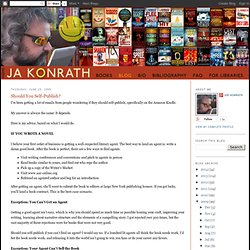
My answer is always the same: It depends. Here is my advice, based on what I would do.IF YOU WROTE A NOVEL I believe your first order of business is getting a well-respected literary agent. The best way to land an agent is: write a damn good book. After the book is perfect, there are a few ways to find agents. Visit writing conferences and conventions and pitch to agents in personRead books similar to yours, and find out who reps the authorPick up a copy of the Writer's MarketVisit www.aar-online.orgBefriend an agented author and beg for an introductionAfter getting an agent, she'll want to submit the book to editors at large New York publishing houses. Exception: You Can't Get an Agent. How to Write a Terrific Author Bio. The Ultimate Guide to Publishing Your eBook on Amazon’s Kindle Platform. The Do’s and Don’ts of Cover Design: Publishing Lesson #1.
A good cover can make or break a book, especially for on-line buying.
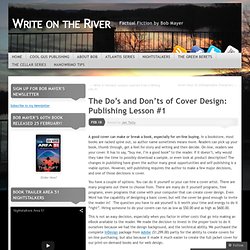
In a bookstore, most books are racked spine out, so author name sometimes means more. Readers can pick up your book, thumb through, get a feel for story and writing and then decide. On-line, readers see your cover. It has to say, “buy me, I’m a good book” to the reader. If it doesn’t, why would they take the time to possibly download a sample, or even look at product description? You have a couple of options. This is not an easy decision, especially when you factor in other costs that go into making an eBook available to the reader. Even with the proper tools we made a few cover mistakes along the way. Publishing Mistake #1: Always Judge a Book by its Cover. This cover sucks. First. Second. Third. How To Write A Book And Get Published, Writing A Book - The Writers Workshop. Top 8 Cover Design Tips for Self-Publishers. We’ve all seen them.

The train wrecks. The art class projects. The cringe-inducing artwork. It’s the world of do-it-yourself book cover design. Somewhere between the quirky “cover design generators” on author-service company websites, and the All-American view that everyone should get a ribbon because, after all, they participated, the cover design is suffering at the hands of self-publishers. And no, I’m not saying that self-published books aren’t getting better—there are a lot of great-looking indie books out there. Book cover design, at its height, is an amazing commercial art. But anyone who can write and publish a book ought to be able to avoid at least the worst mistakes in cover design. Establish a principal focus for the cover—Nothing is more important. Resources. Gareth L Powell - science fiction writer. A few months ago, I sold my unfinished second novel, The Recollection, to Solaris Books on the strength of the first fifty pages and a synopsis.
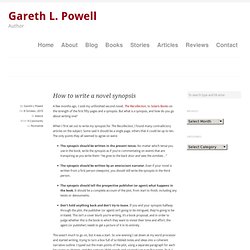
But what is a synopsis, and how do you go about writing one? When I first set out to write my synopsis for The Recollection, I found many contradictory articles on the subject. Tips For Describing & Summarizing Your Story & Pitching Your Plot Ideas. When you summarize or describe your story or plots to people, it's important to do so in an engaging and comprehensive manner.
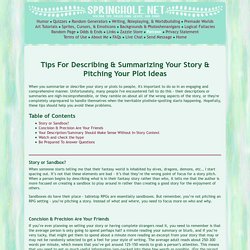
Unfortunately, many people I've encountered fail to do this - their descriptions or summaries are nigh-incomprehensible, or they ramble on about all of the wrong aspects of the story, or they're completely unprepared to handle themselves when the inevitable plothole-spotting starts happening. Hopefully, these tips should help you avoid these problems. Story or Sandbox? When someone starts telling me that their fantasy world is inhabited by elves, dragons, demons, etc., I start spacing out. It’s not that these elements are bad - it’s that they’re the wrong point of focus for a story pitch. Sandboxes do have their place - tabletop RPGs are essentially sandboxes.
Concision & Precision Are Your Friends.